HDTGM: A Conversation With Mick Garris, Director Of 'Sleepwalkers'
We may receive a commission on purchases made from links.
From quirky hits (like *batteries not included and Critters 2) to epic haunts (like Stephen King's The Stand), filmmaker Mick Garris has proven himself to be one of the industry's true masters of horror. Literally, even; creating the beloved Showtime series Masters of Horror. With such an impressive portfolio of spooky stories under his belt, it'd likely be hard for any horror fan to pick their favorite Garris project. And yet, almost instantly, they'd probably discard one of his films from contention: Sleepwalkers.
So naturally, that's the film that I wanted to speak with Mick Garris about. But before we went back in time to discuss how Sleepwalkers got made, we talked about the making of his career; an amazing story that involves interviewing auteurs, operating R2D2s and catching the eye of Steven Spielberg (then later Stephen King).
Mick Garris Interview
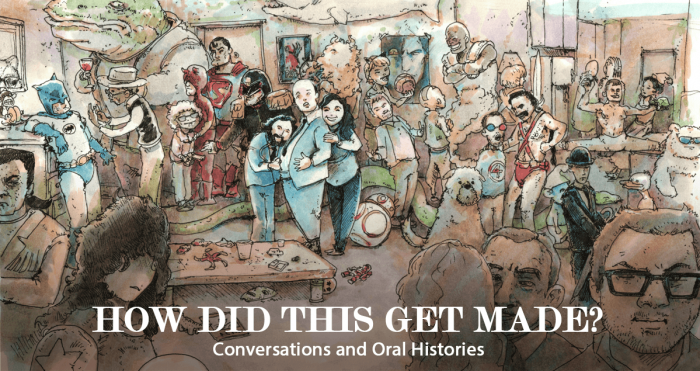 How Did This Get Made is a companion to the podcast How Did This Get Made with Paul Scheer, Jason Mantzoukas and June Diane Raphael which focuses on movies This regular feature is written by Blake J. Harris, who you might know as the writer of the book Console Wars, soon to be a motion picture produced by Seth Rogen and Evan Goldberg. You can listen to the Sleepwalkers edition of the HDTGM podcast here. Synopsis: When Charles and Mary Brady move to a sleepy Indiana town, the residents are eager to welcome this duo with open arms. But little do they realize that these newcomers are actually shape-shifting cat-like creatures who are there to feast on virgins.Tagline: They feast on your fear...and it's dinner time.
How Did This Get Made is a companion to the podcast How Did This Get Made with Paul Scheer, Jason Mantzoukas and June Diane Raphael which focuses on movies This regular feature is written by Blake J. Harris, who you might know as the writer of the book Console Wars, soon to be a motion picture produced by Seth Rogen and Evan Goldberg. You can listen to the Sleepwalkers edition of the HDTGM podcast here. Synopsis: When Charles and Mary Brady move to a sleepy Indiana town, the residents are eager to welcome this duo with open arms. But little do they realize that these newcomers are actually shape-shifting cat-like creatures who are there to feast on virgins.Tagline: They feast on your fear...and it's dinner time.
Part 1: An Overwhelming Mallet to the Head
Blake J. Harris: Hey, what are you up to?Mick Garris: Oh, there's a bunch of stuff going on. I've got my own podcast. And I'm in the middle of a secret project that I can't talk much about. It hopefully will not be featured on How Did This Get Made?Blake J. Harris: [laughs] What did you think listening to the episode?Mick Garris: Oh, I actually thought it was very entertaining. I was delighted [laughs] by how many good things they found in the movie. I was very amused by the things they didn't like and [answering the episode's big question] yes, they were mother and son.Blake J. Harris: That was the burning question.Mick Garris: Yeah. It was a lot of fun. I laughed a lot. And I only cringed a few times as the nails went into my ankles and palms.Blake J. Harris: Well let's start by talking about non-cringe-worthy moments. Tell me a little bit more about you and how you got into filmmaking. And personally, as a writer and journalist, I'd love to hear about your journalism background too.Mick Garris: Well, I actually started writing for my high school newspaper, doing interviews. My first interview was with the Moody Blues. You know, I was very much into music. Staring at 18, I was in a band for seven years. A prog rock band. I was the lead singer and a song-writer (not a very good one). There's some stuff online, but none of it was ever professionally recorded. It's all demo quality stuff. From an era where we didn't have GarageBand.Blake J. Harris: Right.Mick Garris: There's some stuff you can find out there, in drips and drabs. But as far as writing, I did journalism for the local underground newspaper: The San Diego Door, which was the paper that Cameron Crowe was writing for that he made Almost Famous about. And we both ended up making movies later on.Blake J. Harris: Yup. And how did you get into screenwriting?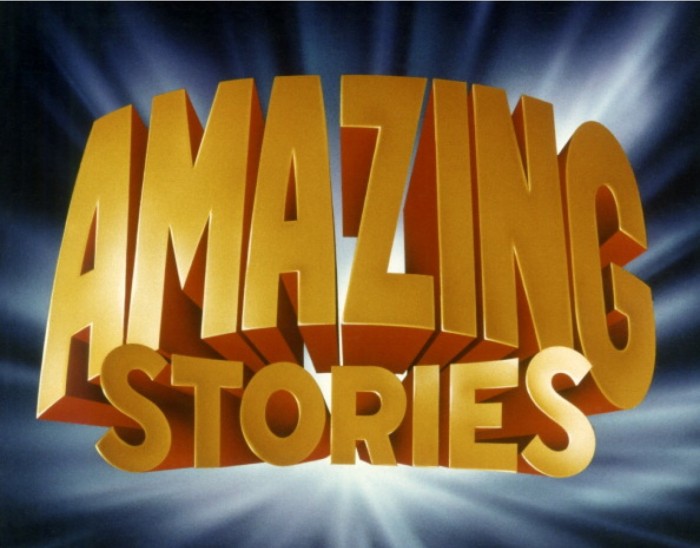 Mick Garris: The first guy to hire me as a screenwriter was Steven Spielberg for Amazing Stories. I realized years later that I was the first person asked to write a script for the show. And then I wrote another one and they asked me to go on staff there. So my own personal amazing story...Blake J. Harris: I'm sure that it's an amazing story probably worthy of its own podcast, but what's the short version of how you even got that opportunity?Mick Garris: Well I had been doing film journalism for a while, for various publications and the like. And the "Z Channel" was the first paid channel in LA. Even before they started to carry HBO. So I went to them and I first started writing for their channel guide; you know, doing stories about the movies they would run. And I proposed to them an interview show called The Fantasy Film Festival.Blake J. Harris: Okay.Mick Garris: So they went it and [laughs] I made the grand sum of $100 a show.Blake J. Harris: Ha!Mick Garris: And so they would tell me the movies that they had programmed and were coming up and asked who I could get. So I did John Boorman for Zardoz. I got Steven Spielberg for Close Encounters of the Third Kind. I was just very excited and enthusiastic and managed to track these people down. And because of where this cable system was located—you know: Beverly Hills, west side LA—a lot of the people in Hollywood watched it.Blake J. Harris: Okay.Mick Garris: I was not the world's greatest interviewer, but it was always about the subject and in the genre. And it got a bit of a following. So I managed to get a job...my first movie job was answering phones for the Star Wars.Blake J. Harris: Really? That's great.Mick Garris: Yeah. At the grand sum of $150 a week. And then I was hired to operate R2D2 at various personal appearances. Including the Oscars that year. Yeah. The first and only time I'll ever attend an Oscars, I'm sure. And so this is a very long and boring story...Blake J. Harris: No, no! This is great. I even have more questions. So I'm curious: when you're doing the Z Channel show and you're speaking with all these really interesting people at such an exciting time, what did you learn about filmmaking? Which I know is hard to boil down to a few sentences...Mick Garris: Well, it was the sort of thing you learn when you read film magazines and the like. They weren't guests promoting something necessarily at the time. They were there to do just more like a conversation. So it wasn't Entertainment Tonight sound bytes. But the people who make movies, these were people were like me. They loved movies (they were born with sprockets, maybe), but it was just an enthusiasm. There wasn't a lot of technical things I learned then. But just the creative approaches that people had. And what was more important to them? Was it the technical stuff or was it emotional stuff? You know, everybody approaches it from a different direction. And directors don't work together. That was kind of an overwhelming mallet to the head. Wow. The filmmakers are very much in their own kind of bubble.Blake J. Harris: Right.Mick Garris: So it was kind of a revelation to me and I realized why so many of the great filmmakers are one of a kind people. You know, they have a vision. They may be influenced by other filmmakers, but they don't work with them on anything. So it was a pretty great revelation.Blake J. Harris: And that's pretty different than screenwriting. What was the beginning of your screenwriting career like, after Amazing Stories? And how did you begin to work your way up, or around, the industry?Mick Garris: You know, I was in my early 30s when I was knighted by King Steven. Suddenly, all the agencies and studios who never read my scripts when they were submitted; suddenly they were offering me jobs. Still having not read any of my scripts!Blake J. Harris: [cracks up] Yup.
Mick Garris: The first guy to hire me as a screenwriter was Steven Spielberg for Amazing Stories. I realized years later that I was the first person asked to write a script for the show. And then I wrote another one and they asked me to go on staff there. So my own personal amazing story...Blake J. Harris: I'm sure that it's an amazing story probably worthy of its own podcast, but what's the short version of how you even got that opportunity?Mick Garris: Well I had been doing film journalism for a while, for various publications and the like. And the "Z Channel" was the first paid channel in LA. Even before they started to carry HBO. So I went to them and I first started writing for their channel guide; you know, doing stories about the movies they would run. And I proposed to them an interview show called The Fantasy Film Festival.Blake J. Harris: Okay.Mick Garris: So they went it and [laughs] I made the grand sum of $100 a show.Blake J. Harris: Ha!Mick Garris: And so they would tell me the movies that they had programmed and were coming up and asked who I could get. So I did John Boorman for Zardoz. I got Steven Spielberg for Close Encounters of the Third Kind. I was just very excited and enthusiastic and managed to track these people down. And because of where this cable system was located—you know: Beverly Hills, west side LA—a lot of the people in Hollywood watched it.Blake J. Harris: Okay.Mick Garris: I was not the world's greatest interviewer, but it was always about the subject and in the genre. And it got a bit of a following. So I managed to get a job...my first movie job was answering phones for the Star Wars.Blake J. Harris: Really? That's great.Mick Garris: Yeah. At the grand sum of $150 a week. And then I was hired to operate R2D2 at various personal appearances. Including the Oscars that year. Yeah. The first and only time I'll ever attend an Oscars, I'm sure. And so this is a very long and boring story...Blake J. Harris: No, no! This is great. I even have more questions. So I'm curious: when you're doing the Z Channel show and you're speaking with all these really interesting people at such an exciting time, what did you learn about filmmaking? Which I know is hard to boil down to a few sentences...Mick Garris: Well, it was the sort of thing you learn when you read film magazines and the like. They weren't guests promoting something necessarily at the time. They were there to do just more like a conversation. So it wasn't Entertainment Tonight sound bytes. But the people who make movies, these were people were like me. They loved movies (they were born with sprockets, maybe), but it was just an enthusiasm. There wasn't a lot of technical things I learned then. But just the creative approaches that people had. And what was more important to them? Was it the technical stuff or was it emotional stuff? You know, everybody approaches it from a different direction. And directors don't work together. That was kind of an overwhelming mallet to the head. Wow. The filmmakers are very much in their own kind of bubble.Blake J. Harris: Right.Mick Garris: So it was kind of a revelation to me and I realized why so many of the great filmmakers are one of a kind people. You know, they have a vision. They may be influenced by other filmmakers, but they don't work with them on anything. So it was a pretty great revelation.Blake J. Harris: And that's pretty different than screenwriting. What was the beginning of your screenwriting career like, after Amazing Stories? And how did you begin to work your way up, or around, the industry?Mick Garris: You know, I was in my early 30s when I was knighted by King Steven. Suddenly, all the agencies and studios who never read my scripts when they were submitted; suddenly they were offering me jobs. Still having not read any of my scripts!Blake J. Harris: [cracks up] Yup.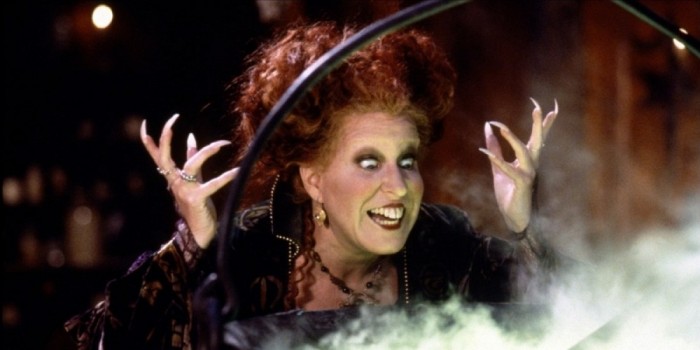 Mick Garris: But someone else had made the decision for them that I was hirable. It happened to be Spielberg at the height of his career. It was really great. I was hired to write The Fly II. Which there were four other writers on it after me. Hocus Pocus. That was something where there were a dozen writers after me that worked on it and it got made 8 years after I wrote it.Blake J. Harris: Well tell me more about that one. That's one of my wife's favorite movies. She was excited to hear I was talking with you. Any behind-the-scenes tidbits from Hocus Pocus? Or any fond memories of how you crafted the story?Mick Garris: Well, it was devised by a producer named David Kirchner who created a character called Strawberry Shortcake, that was animation that also was tied into toys. But he also created An American Tale, the animated film for Spielberg. And he has this wonderful idea about kids in Salem, Massachusetts. And this story of the Sanderson sisters. He and I met, got along great. We both now had the Spielberg connection between us. So we actually initially pitched it to Steven, [after] David had already gotten interest from Disney in doing it. And at that time, Spielberg and Disney were kind of competitive, they didn't want to work together.Blake J. Harris: Okay.Mick Garris: And so I did the first couple of drafts. And it was really great and really exciting and then it just kind of died. And they kept on bringing in other writers. Then, eight years later, they got Bette Midler (at the height of her career) interested. Basically, they had gone back to the script that I had done. They had made some changes—it was much more broadly comedic. Mine was darker, but obviously their commercial instincts were better than mine. And they went back to enough of mine that I'm credited like three times in the credits. So it was nice. And everybody's wife's favorite movie is Hocus Pocus it seems.Blake J. Harris: That's quite an honor! The favorite movie of wives everywhere!
Mick Garris: But someone else had made the decision for them that I was hirable. It happened to be Spielberg at the height of his career. It was really great. I was hired to write The Fly II. Which there were four other writers on it after me. Hocus Pocus. That was something where there were a dozen writers after me that worked on it and it got made 8 years after I wrote it.Blake J. Harris: Well tell me more about that one. That's one of my wife's favorite movies. She was excited to hear I was talking with you. Any behind-the-scenes tidbits from Hocus Pocus? Or any fond memories of how you crafted the story?Mick Garris: Well, it was devised by a producer named David Kirchner who created a character called Strawberry Shortcake, that was animation that also was tied into toys. But he also created An American Tale, the animated film for Spielberg. And he has this wonderful idea about kids in Salem, Massachusetts. And this story of the Sanderson sisters. He and I met, got along great. We both now had the Spielberg connection between us. So we actually initially pitched it to Steven, [after] David had already gotten interest from Disney in doing it. And at that time, Spielberg and Disney were kind of competitive, they didn't want to work together.Blake J. Harris: Okay.Mick Garris: And so I did the first couple of drafts. And it was really great and really exciting and then it just kind of died. And they kept on bringing in other writers. Then, eight years later, they got Bette Midler (at the height of her career) interested. Basically, they had gone back to the script that I had done. They had made some changes—it was much more broadly comedic. Mine was darker, but obviously their commercial instincts were better than mine. And they went back to enough of mine that I'm credited like three times in the credits. So it was nice. And everybody's wife's favorite movie is Hocus Pocus it seems.Blake J. Harris: That's quite an honor! The favorite movie of wives everywhere!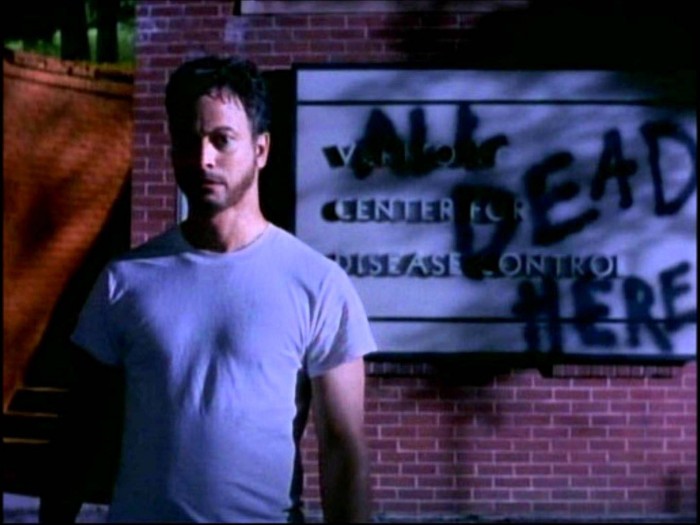 Mick Garris: It is. And everybody knows it and every girl from 4 to 50 seems to be in love with that movie. You know, it's great. That and having done The Stand, which I think was the highest rated miniseries ever. It's really, really great on that stuff. Any of those things.Blake J. Harris: Well, you had said that like 8 years later the movie came out. So I'm kind of curious: you're doing this interview show where you're interviewing people and it's airing. And then you're writing a TV show where episodes are conceivably airing shortly after. But so much of film writing is movies don't ever get made, or they get made years later but different. How did you kind of find creative fulfillment? Or did that not bother you?Mick Garris: For me, I never went into this to make money. I went into it because I'm a writer and that's my passion. You know, you do it...you get an opportunity and you start working with Steven Spielberg for $100,000 a year when you've been on food stamps, it's like: holy shit. The good news is it happened when I was 33. I was not a guy, like, who had come out of film school and wowed Hollywood. But I wrote because I loved writing. And then Disney offered me to direct an episode of the Disney Sunday Movie which was a new series. So suddenly studios were offering me things and I was also writing spec stuff on my own, which I continue to do today. You know, you write it because you love it and you hope you can make it. With luck, you'll sell it. But the vagaries of what sells in Hollywood and what the studios are buying is way beyond me. And way beyond anything I'm interesting. So I do what I do and hope it is something I can get made. I also write books for the same reason. Because I love writing and in books there's nothing between the audience and myself, except the page (electronic or paper).Blake J. Harris: Right.Mick Garris: But it's also a very singular art form. Filmmaking is kind of the ultimate collaborative art form.
Mick Garris: It is. And everybody knows it and every girl from 4 to 50 seems to be in love with that movie. You know, it's great. That and having done The Stand, which I think was the highest rated miniseries ever. It's really, really great on that stuff. Any of those things.Blake J. Harris: Well, you had said that like 8 years later the movie came out. So I'm kind of curious: you're doing this interview show where you're interviewing people and it's airing. And then you're writing a TV show where episodes are conceivably airing shortly after. But so much of film writing is movies don't ever get made, or they get made years later but different. How did you kind of find creative fulfillment? Or did that not bother you?Mick Garris: For me, I never went into this to make money. I went into it because I'm a writer and that's my passion. You know, you do it...you get an opportunity and you start working with Steven Spielberg for $100,000 a year when you've been on food stamps, it's like: holy shit. The good news is it happened when I was 33. I was not a guy, like, who had come out of film school and wowed Hollywood. But I wrote because I loved writing. And then Disney offered me to direct an episode of the Disney Sunday Movie which was a new series. So suddenly studios were offering me things and I was also writing spec stuff on my own, which I continue to do today. You know, you write it because you love it and you hope you can make it. With luck, you'll sell it. But the vagaries of what sells in Hollywood and what the studios are buying is way beyond me. And way beyond anything I'm interesting. So I do what I do and hope it is something I can get made. I also write books for the same reason. Because I love writing and in books there's nothing between the audience and myself, except the page (electronic or paper).Blake J. Harris: Right.Mick Garris: But it's also a very singular art form. Filmmaking is kind of the ultimate collaborative art form.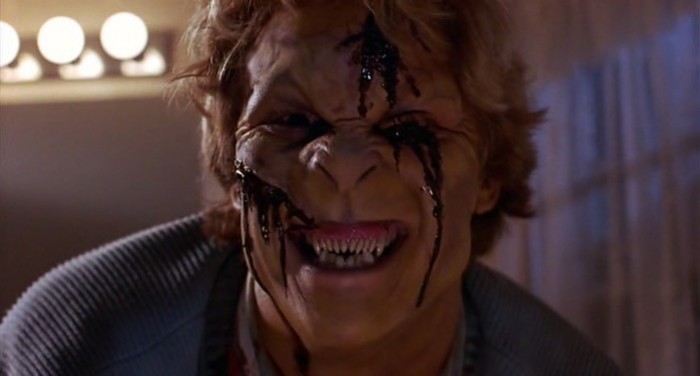
Part 2: Norman Rockwell Goes to Hell
Blake J. Harris: Yeah, filmmaking is a very collaborative meeting. Earlier you mentioned The Stand and Sleepwalkers is based on a script by Stephen King. When did you first meet Stephen, or start having a collaborative relationship with his work?Mick Garris: Sleepwalkers was the very first thing. My agent had called me into a meeting at Columbia. They were looking for a director for it. I have always loved his work. You know, I read every book as soon as it came out. So had a great meeting and at the studio the executives said well we really love you, but there's another guy we have to meet with. Well, the other guy started to re-write it and turn it into, like, "Planet of the Sleepwalkers" and do some things that were so far removed that King was not happy and they weren't going to be able to call it "Stephen King's Sleepwalkers."Blake J. Harris: Gotcha.Mick Garris: So they called me up and asked to go to lunch and talk about it some more. And what I didn't realize is that they hired me and moved me into that office during lunch time. So that was the introduction to it. And I never really met king until we were shooting the cameo. We had only talked on the phone and communicated by—not Skype, there wasn't anything like that back then—by fax!Blake J. Harris: Right, right.Mick Garris: I would ask him: do you want me to do a couple of these changes here? No, let me see what I can do in the next day...and there'd be six pages in the fax machine the next day. We ended up doing something that all of us were very happy with. Which was a very successful movie for the studio. I don't think it's the best work that Stephen and I have done, but I'm proud of that nasty little movie.Blake J. Harris: Nice.Mick Garris: On opening night I went to the Chinese Theater on Hollywood Boulevard. There were a thousand people, it was packed. The song "Sleepwalkers" is playing...then mother and son kiss! And a thousand people in concert together going "Ewwww!" Greatest moment of my moviegoing life.Blake J. Harris: That's amazing. And this is another thing that's kind of hard to put into words, but how would you have described your vision for the film going into it?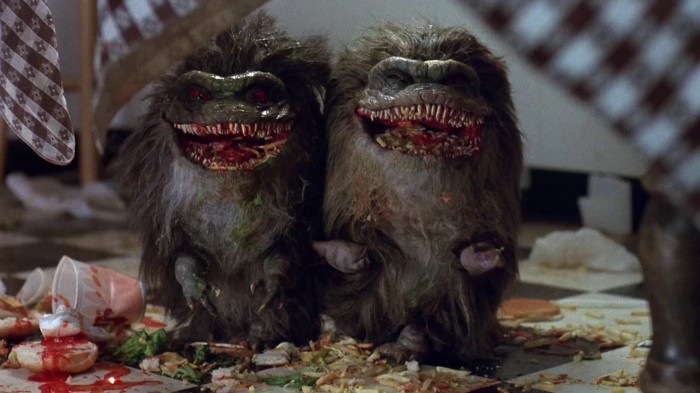 Mick Garris: Well, a theme I like a lot and I had tackled it once before with my "timeless class" Critters II. I love the idea of "Norman Rockwell goes to Hell." To just turn expectations on their head. So, you know, they're talking—Paul and June and Jason and all—they were talking about expectations. And when the movie didn't meet their expectations in storytelling and the like. To me, that's kind of cool. But that's also...there were a couple of ideas I put into it that hadn't been in King's original script. One is the introduction and title sequence from that page in the "Book of Arcane Knowledge" (which I invented) to give it a little backstory. And another was the scene where the Sleepwalkers are making love. No, they're not making love. They're f***ing.Blake J. Harris: [laughs]Mick Garris: That was to show, with that blue glow that he sucks out of Tanya...he sucks the life force out of a virginal woman and feeds it sexually to his mother. Injects it into his mother, if you will. With the same blue glow. So those were my two attempts to make it as clear as it needed to be, as far as King and I felt.Blake J. Harris: And how was the production? Was it a generally smooth production?Mick Garris: Well, they [the studio] kind of turned their back on us. There were three movies in production on the Columbia lot at that time: Coppola's Dracula, Spielberg's Hook, and Sleepwalkers. So it was like: Francis, Steven and [with delighted shock] Mick?!Blake J. Harris: Ha!Mick Garris: So we're under the radar, the red-headed stepchild that no one was paying attention to us. When the movie started shooting, the original head of the studio, Frank Price, he had said, "There's never going to be a movie about a mother and son having sex while I'm the head of the studio." Well, he was right. He got fired halfway through!Blake J. Harris: That's amazing.Mick Garris: So it was very prescient of Mr. Price. Anyway, the movie was very under the radar. We had budgetary restrictions and the like. I had a Director of Photography who had mostly done television (which is much more flexible in terms of post-production) and how you time things, which I won't get into, but the studio didn't like what he was doing so I had to fight to keep him on. Or, you know, get my balls cut off by the studio. But it was mostly a really good experience with a hardass New York line producer slamming us all the time. Taking a whip to us and keeping us going...
Mick Garris: Well, a theme I like a lot and I had tackled it once before with my "timeless class" Critters II. I love the idea of "Norman Rockwell goes to Hell." To just turn expectations on their head. So, you know, they're talking—Paul and June and Jason and all—they were talking about expectations. And when the movie didn't meet their expectations in storytelling and the like. To me, that's kind of cool. But that's also...there were a couple of ideas I put into it that hadn't been in King's original script. One is the introduction and title sequence from that page in the "Book of Arcane Knowledge" (which I invented) to give it a little backstory. And another was the scene where the Sleepwalkers are making love. No, they're not making love. They're f***ing.Blake J. Harris: [laughs]Mick Garris: That was to show, with that blue glow that he sucks out of Tanya...he sucks the life force out of a virginal woman and feeds it sexually to his mother. Injects it into his mother, if you will. With the same blue glow. So those were my two attempts to make it as clear as it needed to be, as far as King and I felt.Blake J. Harris: And how was the production? Was it a generally smooth production?Mick Garris: Well, they [the studio] kind of turned their back on us. There were three movies in production on the Columbia lot at that time: Coppola's Dracula, Spielberg's Hook, and Sleepwalkers. So it was like: Francis, Steven and [with delighted shock] Mick?!Blake J. Harris: Ha!Mick Garris: So we're under the radar, the red-headed stepchild that no one was paying attention to us. When the movie started shooting, the original head of the studio, Frank Price, he had said, "There's never going to be a movie about a mother and son having sex while I'm the head of the studio." Well, he was right. He got fired halfway through!Blake J. Harris: That's amazing.Mick Garris: So it was very prescient of Mr. Price. Anyway, the movie was very under the radar. We had budgetary restrictions and the like. I had a Director of Photography who had mostly done television (which is much more flexible in terms of post-production) and how you time things, which I won't get into, but the studio didn't like what he was doing so I had to fight to keep him on. Or, you know, get my balls cut off by the studio. But it was mostly a really good experience with a hardass New York line producer slamming us all the time. Taking a whip to us and keeping us going...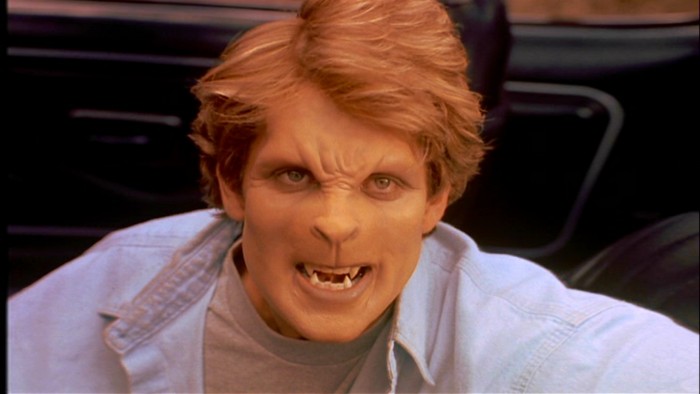
Part 3: Stephen King, King Steven and the Quest to Make You Feel
Mick Garris: You know, that day that we had King come in to do his cameo with Clive Barker and Tobe Hooper was kind of amazing day. We're on location, I've never met King before in person, and we're having our morning breakfast going, "King's gonna be here soon! He can only be here for a couple of hours!"Blake J. Harris: The excitement builds...Mick Garris: Yup. And then I broke my tooth on my morning granola. While we were all having breakfast before. I had to get rushed down to my dentist and get an emergency crown put on. "Faster, faster, Stephen King is coming!"Blake J. Harris: [laughs]Mick Garris: Getting there, we had two hours to shoot the scene. It's all in one camera set up. If you took that scene and clipped it off right before the cop starts talking to Tanya, you'd never miss it for a moment. But for horror geeks like myself, it's like an orgasm.Blake J. Harris: I know it was a long time ago, but which scene, or scenes, do you remember being the hardest to get.Mick Garris: The cats, obviously. There were 126 of them. But a lot of that was done second unit.Blake J. Harris: Gotcha.Mick Garris: The car chase was difficult. We had hired Mickey Moore to be the Second Unit Director. He was Spielberg's Second Unit Director on Indiana Jones and all these things so I thought there was going to be a spectacular car chase. And then he had a heart attack and was not able to work. So his cameraman was going to try and handle it, but it was kind of flat.Blake J. Harris: Wow.Mick Garris: Action is not what I excel at, or am most interested in. Or have had the most experience in. It was something we went back and re-shot and worked with the cameraman. And I just kind of tried my hand at a pedal-to-the-medal car chase, which I'd never really done before. So technically that was the most demanding.Blake J. Harris: I can imagine.Mick Garris: But the scene at the end, where the dying son of Mary Brady is lying there bleeding, I'm directing this really ridiculous—wonderfully ridiculous, in my twisted mind—scene, and Steven Spielberg shows up. He's sitting there in a chair and I'm like, "Uh, can I get anything for your Steven! Do you want to talk about the film?!"Blake J. Harris: Ha!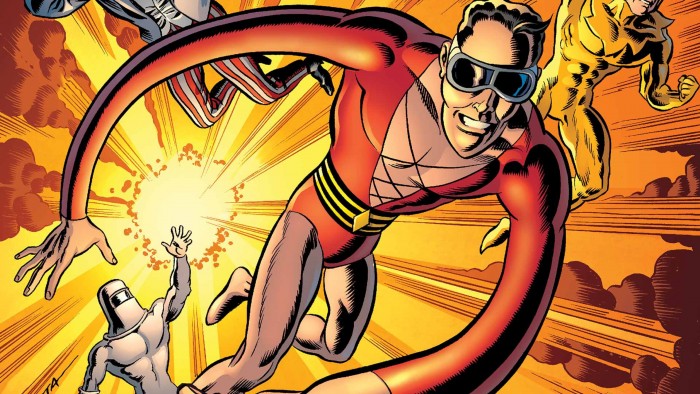 Plastic ManMick Garris: "No," he said. "I just want to watch." [laughs] That may have been the most psychologically pressured moment. But then the next day they called and asked if I wanted to direct Plastic Man. So I guess he had a good time. Plastic Man, of course, never got made. But it's an honor to be asked.Blake J. Harris: For sure. You had said earlier that action scenes were not your forte. I think it's fair to say that horror and twisted, creepy things is certainly up there for you. What is it about the horror genre—trying to scare people, creep people out and taking "Norman Rockwell to Hell"—that appeals to you?Mick Garris: [laughs] Well, I like getting inside and having an effect. Something other than the external. Not just a boo moment or a splatter moment. But there are things that get under your skin and make you uncomfortable. Like in Masters of Horror I did an adaptation of a short story of mine that a write 20 years before. Called "Chocolate." It's about a guy who's receiving senses from someone else. He doesn't know who, or where they are. He discovers it's a woman he experiences her getting f***ed by her boyfriend. So he's experiencing being penetrated (not, you know, anally or anything) but as if he'd had a vagina.Blake J. Harris: Gotcha.Mick Garris: So I'm doing this scene, I've never seen one like it. And I had called in other directors—there were three directors editing at a time when we did that series—and so I called them in to look at the scene, as we would so often do with each other. And it made them so uncomfortable that I left with the biggest smile on my face! You know, to be able to affect people in a way that's not just a simple reaction.Blake J. Harris: Right.Mick Garris: Emotional scenes as well. Not just darkly emotional, but I want to make you feel something (rather than make you see something). That's what I love so much about Stephen King. The horror stuff wouldn't work if it weren't for how good the non-horror stuff was. How great the characters are, how real the world is around you. [laughs] Not that Sleepwalkers is necessarily representative of that, but it has some real uncomfortable stuff. I mean the Sleepwalkers f***ing, and mother and son kissing, and pushing her up the stairs into the bedroom where we get our first taste of the purple glow. Those things...it's really fun to try and go someplace that no one's ever gone before.Blake J. Harris: Yeah, I really like that. [laughing] So obviously you take tremendous pride in having the mother and son f***, but looking back—I don't know the last time you saw the movie—but what are some of the things you're most proud of from that movie?Mick Garris: It's interesting: I have seen it kind of a lot lately. Even though it's a silly movie in many respects, it has a second life. It gets revived a lot. It plays at theaters a lot. This is its 25th anniversary, so it's been getting a lot of attention again. But in terms of my favorite memories, [Sleepwalkers] was also the only time I ever shot a feature film on a studio lot. Which was a great experience. I had done that with Amazing Stories, and had an office on the Universal lot (in the Amblin building). There's something really, really exciting about that process. Because so much else is in the independent world, where you're really scrambling for anything you can get.Blake J. Harris: Right.Mick Garris: So all of those things gave me access to talent that I might not otherwise have had. So the casting process was great. Working with Alice Krige was amazing. I had seen her in Ghost Story, and that's why I cast her. Because she knocked me out, she's so unique. And she played it so straight in something that could have easily been played camp. She is such a great dramatic actress. She took it so very seriously, that was great. It was the first time I worked with Ron Perlman (before I worked with later on Desperation]. And Mädchen Amick had just come off of Twin Peaks, and was really somebody exciting to work with. So it was a great experience. And it was a hit! The movie was number one at the box office.
Plastic ManMick Garris: "No," he said. "I just want to watch." [laughs] That may have been the most psychologically pressured moment. But then the next day they called and asked if I wanted to direct Plastic Man. So I guess he had a good time. Plastic Man, of course, never got made. But it's an honor to be asked.Blake J. Harris: For sure. You had said earlier that action scenes were not your forte. I think it's fair to say that horror and twisted, creepy things is certainly up there for you. What is it about the horror genre—trying to scare people, creep people out and taking "Norman Rockwell to Hell"—that appeals to you?Mick Garris: [laughs] Well, I like getting inside and having an effect. Something other than the external. Not just a boo moment or a splatter moment. But there are things that get under your skin and make you uncomfortable. Like in Masters of Horror I did an adaptation of a short story of mine that a write 20 years before. Called "Chocolate." It's about a guy who's receiving senses from someone else. He doesn't know who, or where they are. He discovers it's a woman he experiences her getting f***ed by her boyfriend. So he's experiencing being penetrated (not, you know, anally or anything) but as if he'd had a vagina.Blake J. Harris: Gotcha.Mick Garris: So I'm doing this scene, I've never seen one like it. And I had called in other directors—there were three directors editing at a time when we did that series—and so I called them in to look at the scene, as we would so often do with each other. And it made them so uncomfortable that I left with the biggest smile on my face! You know, to be able to affect people in a way that's not just a simple reaction.Blake J. Harris: Right.Mick Garris: Emotional scenes as well. Not just darkly emotional, but I want to make you feel something (rather than make you see something). That's what I love so much about Stephen King. The horror stuff wouldn't work if it weren't for how good the non-horror stuff was. How great the characters are, how real the world is around you. [laughs] Not that Sleepwalkers is necessarily representative of that, but it has some real uncomfortable stuff. I mean the Sleepwalkers f***ing, and mother and son kissing, and pushing her up the stairs into the bedroom where we get our first taste of the purple glow. Those things...it's really fun to try and go someplace that no one's ever gone before.Blake J. Harris: Yeah, I really like that. [laughing] So obviously you take tremendous pride in having the mother and son f***, but looking back—I don't know the last time you saw the movie—but what are some of the things you're most proud of from that movie?Mick Garris: It's interesting: I have seen it kind of a lot lately. Even though it's a silly movie in many respects, it has a second life. It gets revived a lot. It plays at theaters a lot. This is its 25th anniversary, so it's been getting a lot of attention again. But in terms of my favorite memories, [Sleepwalkers] was also the only time I ever shot a feature film on a studio lot. Which was a great experience. I had done that with Amazing Stories, and had an office on the Universal lot (in the Amblin building). There's something really, really exciting about that process. Because so much else is in the independent world, where you're really scrambling for anything you can get.Blake J. Harris: Right.Mick Garris: So all of those things gave me access to talent that I might not otherwise have had. So the casting process was great. Working with Alice Krige was amazing. I had seen her in Ghost Story, and that's why I cast her. Because she knocked me out, she's so unique. And she played it so straight in something that could have easily been played camp. She is such a great dramatic actress. She took it so very seriously, that was great. It was the first time I worked with Ron Perlman (before I worked with later on Desperation]. And Mädchen Amick had just come off of Twin Peaks, and was really somebody exciting to work with. So it was a great experience. And it was a hit! The movie was number one at the box office.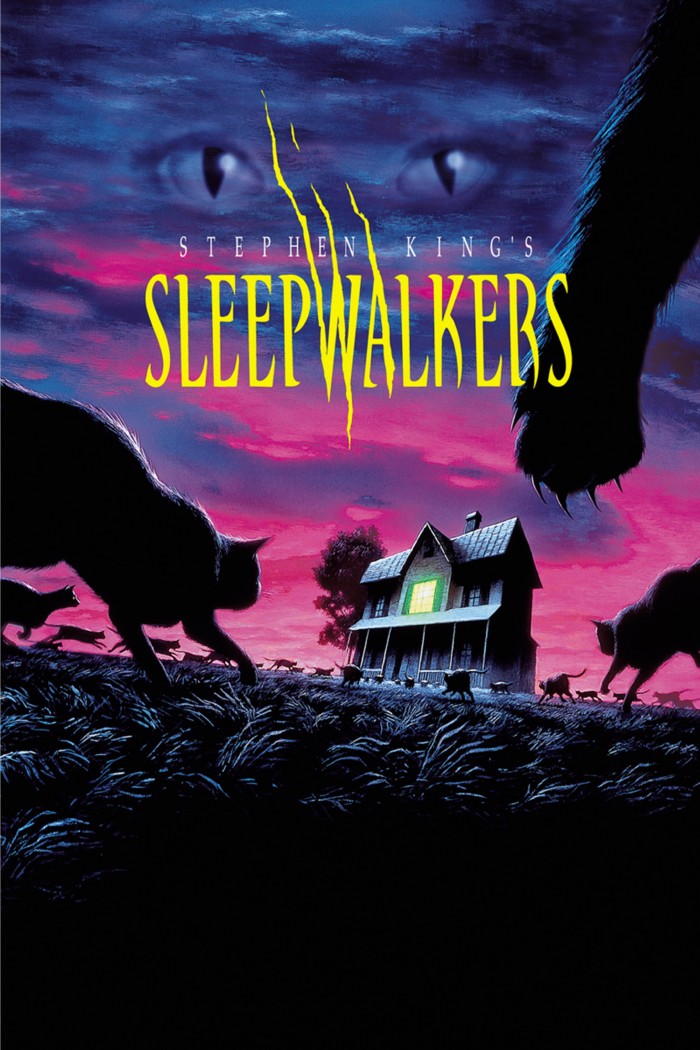 During its opening weekend, Sleepwalkers nearly tripled the take of the next highest grossing new release (Ferngully: The Last Rainforest). And, as Garris mentioned, it finished number one at the box office; comfortably edging out Basic Instinct (in its 4th weekend), White Men Can't Jump (3rd) and Beethoven (2nd).Mick Garris: I was at movie theaters left and right seeing sold out shows. Filled with people screaming, people laughing, people reacting in a physical way. And this is after my first feature, Critters 2—which again, has been revived a lot lately; every Easter it seems to play at a lot of theaters and now has a cult following—but it was a disaster! Opening day I went to my local theater and there were three people in the theater.Blake J. Harris: [cracks up] Ouch.Mick Garris: It was depressing as hell! The whole point is you're telling a story to an audience. So when there's no audience, it's like cinematic masturbation.Blake J. Harris: Right.Mick Garris: So it was a great experience to have that [the box office success of Sleepwalkers] under my belt. And it opened up the relationship with King, you know? Since then, we've become good friends. We've worked together a lot. I've directed more Stephen King than anybody. And had some of the best experiences of my professional life with him.Blake J. Harris: That's great. Like you said, the movie did really well and it still lives on. So it's earned plenty of positive reactions. But I was curious what have been some of your favorite reactions to the film? Or some of the most interesting over the years?Mick Garris: [thinks for a moment] King had director approval on it. And I think one of the reasons that he agreed to me doing it was because he'd seen Psycho IV, which I had directed shortly before. And both of them are about incest. Norman Bates having sex with his mother, and doing the same thing with Sleepwalkers and mother and son having sex. It's like...[laughing] I don't know that I want to complete the trilogy. Like: don't tell my mother about this!Blake J. Harris: Hahaha.Mick Garris: But there's been...well, actually, June's reaction [on the podcast]. She could not take the movie if it really is a mother and son. "They're creatures, they're not really mother and son!"Blake J. Harris: Right.Mick Garris: To me, that's a hilarious reaction. That's one of my favorites, to tell you the truth. To not be able to take the very basis of the film, makes me smile.Blake J. Harris: That's so funny. Yeah, you're "Mick Garris: Mr. Oedipal Complex." You've got this!Mick Garris: [cracks up] Oh god!Blake J. Harris: The last thing I wanted to ask you, certainly not related to Sleepwalkers, but you've been interviewing people for 30, 40 years now. How have you changed as an interviewer and what do you like so much about interviewing people?Mick Garris: Well, the difference between the original interviews (from newspapers and magazines and the Z Channel show) was I was a student of film and a film fan and a journalist approaching it from that side. The way it's changed over the years as I've become a filmmaker myself is I'm able to talk as a peer. To talk with people who have the same job that I do and maybe I can bring a little bit more of a perspective into it that someone from the outside-in may not have. And a lot of these people that I do interview, I'm good friends with. So it just turns into a conversation, rather than a specific interviewing situation, you know?Blake J. Harris: That makes sense.Mick Garris: It's not necessarily to promote a film or anything. For example, I've met Walter Hill a couple of times at festivals and screenings and stuff. I didn't know him well, but the opportunity to speak with him when The Assignment was coming out... this would be a great chance for us to talk. Let's talk for an hour and put it out there! So it's a lot more casual and a lot more probing, even though the questions come more easily. Because they understand I've been in the trenches too. So it's much more a conversation than an interview. At least that's the attempt.Blake J. Harris: So I guess let me ask you one more question: do you think that the appetite for that has changed over the years? Now with podcasts and long form audio content, do you think that's why we're seeing a lot more "conversations" as opposed to "interviews?" Or has that always kind of been out there if you were able to find it?Mick Garris: No, there's much much more of it out there. Because, you know, everyone has an opinion, and everyone has a podcast! But even before that though, with DVD and Blu-ray commentaries. That was something that wasn't around when I was learning how to make movies.Blake J. Harris: Great point. That's a great point.Mick Garris: To me, what I'm trying to do, is the equivalent of a Blu-Ray commentary conversation. Rather than an interview. So: why these choices? Who are you as a human being and as a filmmaker? And how does that reflect on your work? So I love that there are so many opportunities. It's just—as you know—it's difficult to kind of find your way through what's the stuff worth listening to.
During its opening weekend, Sleepwalkers nearly tripled the take of the next highest grossing new release (Ferngully: The Last Rainforest). And, as Garris mentioned, it finished number one at the box office; comfortably edging out Basic Instinct (in its 4th weekend), White Men Can't Jump (3rd) and Beethoven (2nd).Mick Garris: I was at movie theaters left and right seeing sold out shows. Filled with people screaming, people laughing, people reacting in a physical way. And this is after my first feature, Critters 2—which again, has been revived a lot lately; every Easter it seems to play at a lot of theaters and now has a cult following—but it was a disaster! Opening day I went to my local theater and there were three people in the theater.Blake J. Harris: [cracks up] Ouch.Mick Garris: It was depressing as hell! The whole point is you're telling a story to an audience. So when there's no audience, it's like cinematic masturbation.Blake J. Harris: Right.Mick Garris: So it was a great experience to have that [the box office success of Sleepwalkers] under my belt. And it opened up the relationship with King, you know? Since then, we've become good friends. We've worked together a lot. I've directed more Stephen King than anybody. And had some of the best experiences of my professional life with him.Blake J. Harris: That's great. Like you said, the movie did really well and it still lives on. So it's earned plenty of positive reactions. But I was curious what have been some of your favorite reactions to the film? Or some of the most interesting over the years?Mick Garris: [thinks for a moment] King had director approval on it. And I think one of the reasons that he agreed to me doing it was because he'd seen Psycho IV, which I had directed shortly before. And both of them are about incest. Norman Bates having sex with his mother, and doing the same thing with Sleepwalkers and mother and son having sex. It's like...[laughing] I don't know that I want to complete the trilogy. Like: don't tell my mother about this!Blake J. Harris: Hahaha.Mick Garris: But there's been...well, actually, June's reaction [on the podcast]. She could not take the movie if it really is a mother and son. "They're creatures, they're not really mother and son!"Blake J. Harris: Right.Mick Garris: To me, that's a hilarious reaction. That's one of my favorites, to tell you the truth. To not be able to take the very basis of the film, makes me smile.Blake J. Harris: That's so funny. Yeah, you're "Mick Garris: Mr. Oedipal Complex." You've got this!Mick Garris: [cracks up] Oh god!Blake J. Harris: The last thing I wanted to ask you, certainly not related to Sleepwalkers, but you've been interviewing people for 30, 40 years now. How have you changed as an interviewer and what do you like so much about interviewing people?Mick Garris: Well, the difference between the original interviews (from newspapers and magazines and the Z Channel show) was I was a student of film and a film fan and a journalist approaching it from that side. The way it's changed over the years as I've become a filmmaker myself is I'm able to talk as a peer. To talk with people who have the same job that I do and maybe I can bring a little bit more of a perspective into it that someone from the outside-in may not have. And a lot of these people that I do interview, I'm good friends with. So it just turns into a conversation, rather than a specific interviewing situation, you know?Blake J. Harris: That makes sense.Mick Garris: It's not necessarily to promote a film or anything. For example, I've met Walter Hill a couple of times at festivals and screenings and stuff. I didn't know him well, but the opportunity to speak with him when The Assignment was coming out... this would be a great chance for us to talk. Let's talk for an hour and put it out there! So it's a lot more casual and a lot more probing, even though the questions come more easily. Because they understand I've been in the trenches too. So it's much more a conversation than an interview. At least that's the attempt.Blake J. Harris: So I guess let me ask you one more question: do you think that the appetite for that has changed over the years? Now with podcasts and long form audio content, do you think that's why we're seeing a lot more "conversations" as opposed to "interviews?" Or has that always kind of been out there if you were able to find it?Mick Garris: No, there's much much more of it out there. Because, you know, everyone has an opinion, and everyone has a podcast! But even before that though, with DVD and Blu-ray commentaries. That was something that wasn't around when I was learning how to make movies.Blake J. Harris: Great point. That's a great point.Mick Garris: To me, what I'm trying to do, is the equivalent of a Blu-Ray commentary conversation. Rather than an interview. So: why these choices? Who are you as a human being and as a filmmaker? And how does that reflect on your work? So I love that there are so many opportunities. It's just—as you know—it's difficult to kind of find your way through what's the stuff worth listening to.
